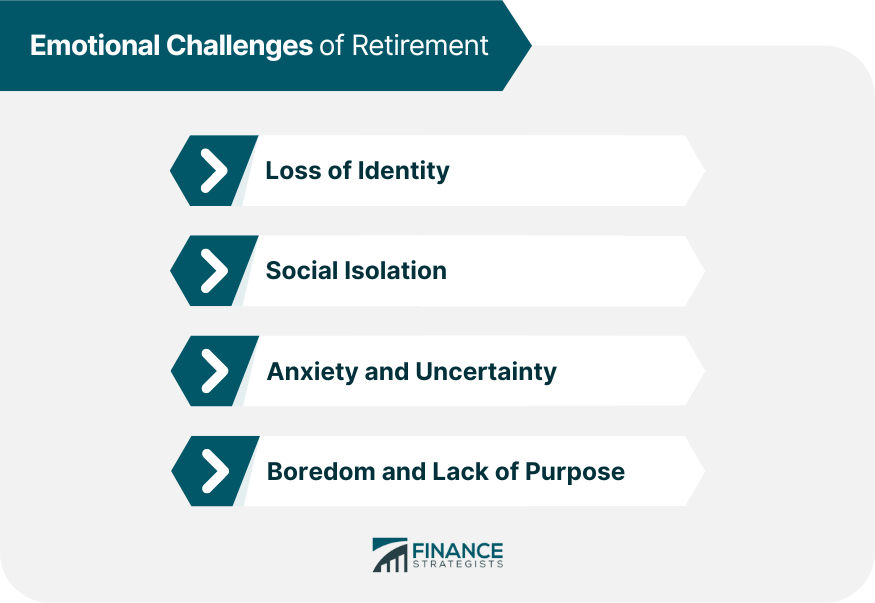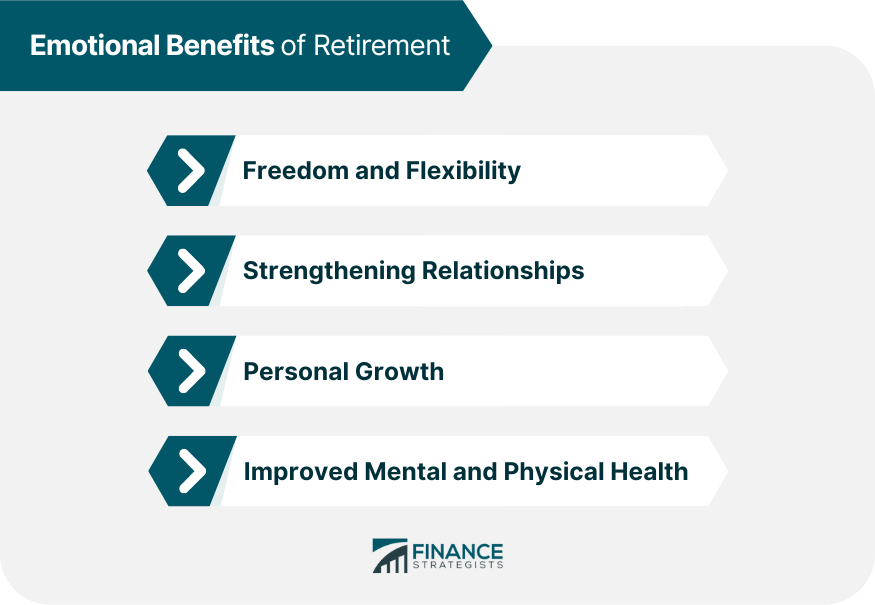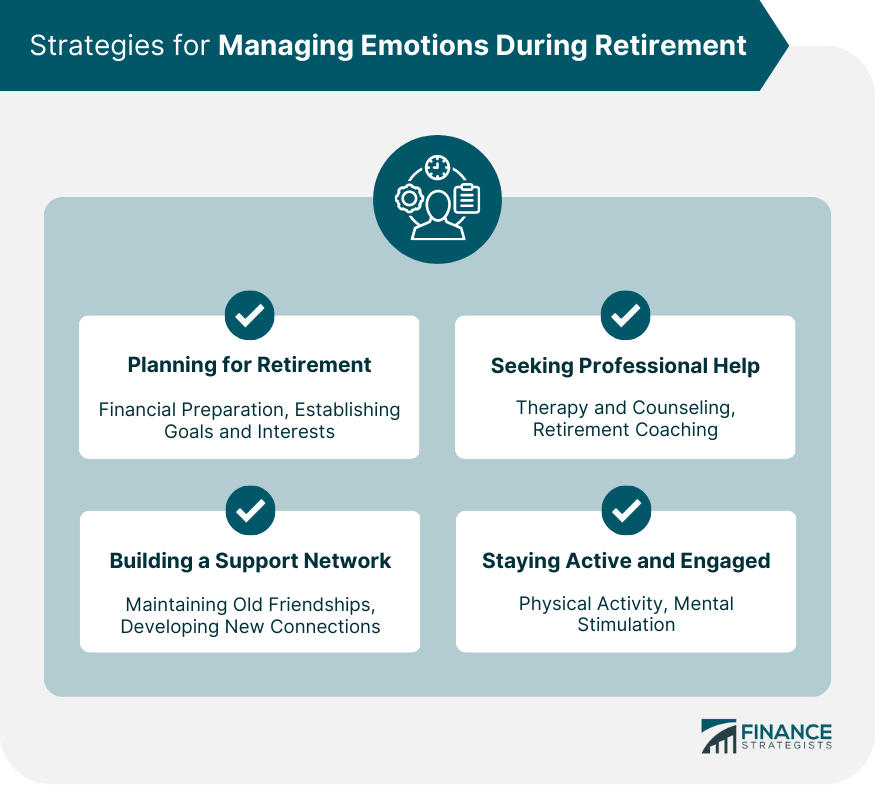Retirement is a significant life transition that many individuals face as they reach the end of their careers. While financial planning is a crucial aspect of this life stage, it is also important to consider the emotional aspects of retirement. Retirement can bring about a range of emotions, including excitement, anxiety, and a sense of loss. By considering the emotional aspects of retirement, individuals can better prepare themselves for this life transition. This may involve thinking about how retirement will impact their sense of identity, social connections, and daily routine, and developing strategies to maintain a sense of purpose and fulfillment. Ignoring the emotional aspects of retirement can lead to negative outcomes such as depression, social isolation, and a loss of purpose. By taking the time to consider and plan for these emotional aspects, individuals can make a more successful transition and enjoy a more fulfilling retirement experience.
For many people, their careers are closely tied to their sense of identity and self-worth. When individuals retire, they may struggle to adjust to their new role in society and experience feelings of inadequacy. Retirees may struggle with the loss of their professional identity, which can lead to feelings of diminished self-worth. This is particularly true for individuals who derived a strong sense of purpose from their careers. Retirement may require individuals to redefine their roles within their family, social circles, and community. This process can be challenging, as it requires retirees to develop new interests and relationships. Retirement often brings significant changes in social interactions, leading to feelings of isolation and loneliness. Retirees may experience decreased social interactions as they no longer see their colleagues daily. Some friends and family members may still work, further limiting social opportunities. Creating new social connections can be difficult for retirees, particularly for those who have relocated or lost touch with friends. Developing a new support network is essential for emotional well-being during retirement. Retirement can be accompanied by anxiety and uncertainty, particularly regarding finances and health. Many retirees worry about having enough money to maintain their desired lifestyle during retirement. Financial anxiety can have a significant impact on emotional well-being. As individuals age, concerns about health and the potential for increased medical expenses can contribute to anxiety and uncertainty. Retirees may experience boredom and struggle to find a sense of purpose in their newfound free time. With the absence of work, retirees must find new ways to occupy their time and maintain a sense of purpose. Setting new personal goals can help retirees maintain a sense of direction and accomplishment during retirement. Retirement can provide individuals with the freedom and flexibility to pursue personal interests and enjoy life at their own pace. Retirees have the opportunity to explore hobbies, interests, and passions that they may not have had time for during their working years. With increased free time, retirees can embark on new travel adventures and engage in leisure activities. Retirement can provide opportunities to strengthen relationships with family and friends. Retirees can invest more time in nurturing relationships with loved ones, leading to deeper connections and experiences. Retirement can be an opportunity for couples and friends to pursue shared interests and create new memories together. Retirement can be a time of personal growth and self-discovery. Retirees can take advantage of their newfound free time to learn new skills, develop new hobbies, or even pursue further education. Many retirees choose to give back to their communities through volunteering, providing a sense of purpose and fulfillment. Retirement can have a positive impact on mental and physical health, particularly for those who experienced high levels of stress during their careers. Leaving the workplace can lead to decreased stress levels, allowing retirees to experience improved mental health and a greater sense of well-being. Retirement provides the opportunity to prioritize personal health and well-being. Retirees can focus on adopting healthier habits, such as regular exercise, improved nutrition, and stress management techniques. Proactively planning for retirement can help individuals manage their emotions and expectations during this transition. Ensuring financial security can help alleviate anxiety surrounding retirement. Developing a comprehensive financial plan with the assistance of a financial advisor can provide peace of mind and confidence in one's financial future. Identifying personal goals and interests prior to retirement can help retirees maintain a sense of purpose and direction during their transition. Maintaining and building a strong support network is crucial for emotional well-being during retirement. Staying in touch with former colleagues and friends can help retirees maintain a sense of connection and belonging. Retirees can benefit from seeking out new social opportunities, such as joining clubs, attending community events, or participating in group activities to foster new friendships and connections. Retirees may benefit from seeking professional assistance to help navigate the emotional aspects of retirement. Working with a therapist or counselor can provide retirees with the support and guidance needed to manage their emotions and adjust to their new lifestyle. Retirement coaches specialize in assisting individuals with the non-financial aspects of retirement, such as developing new interests and managing emotions during this transition. Remaining physically and mentally active can help retirees maintain emotional well-being and a sense of purpose. Engaging in regular exercise can have positive effects on both physical and mental health during retirement. Pursuing intellectually stimulating activities, such as reading, attending classes, or engaging in creative pursuits, can help retirees maintain mental sharpness and emotional well-being. It is essential to acknowledge and address the emotional aspects of retirement, as they play a crucial role in ensuring a fulfilling and rewarding retirement experience. Recognizing the potential challenges and benefits allows individuals to proactively manage their emotions and expectations during this significant transition. With proper planning, support, and engagement, retirement can become a time of self-discovery, personal growth, and deepened connections with loved ones. By focusing on financial preparation, establishing goals and interests, building a strong support network, seeking professional help when needed, and staying physically and mentally active, retirees can navigate the emotional aspects of retirement. They can ultimately embrace a new chapter of their lives filled with happiness and well-being.Emotional Aspects of Retirement: Overview
Emotional Challenges of Retirement
Loss of Identity
Career and Self-Worth
Adjusting to a New Role in Society
Social Isolation
Changes in Social Interactions
Building a New Support Network
Anxiety and Uncertainty
Financial Concerns
Health Concerns
Boredom and Lack of Purpose
Filling the Void of Work
Establishing New Goals

Emotional Benefits of Retirement
Freedom and Flexibility
Time for Personal Interests
Opportunities for Travel and Leisure
Strengthening Relationships
Increased Time With Family and Friends
Pursuing Shared Interests
Personal Growth
Learning New Skills or Hobbies
Volunteering and Giving Back
Improved Mental and Physical Health
Reduced Stress From Work
Opportunities for a Healthier Lifestyle

Strategies for Managing Emotions During Retirement
Planning for Retirement
Financial Preparation
Establishing Goals and Interests
Building a Support Network
Maintaining Old Friendships
Developing New Connections
Seeking Professional Help
Therapy and Counseling
Retirement Coaching
Staying Active and Engaged
Physical Activity
Mental Stimulation

Conclusion
Emotional Aspects of Retirement FAQs
Retirement can bring about a range of emotions, including feelings of loss, loneliness, uncertainty, and anxiety. Many people also experience a sense of freedom and excitement about the new opportunities that retirement can bring.
Retirement can be a significant life transition that involves a loss of identity, routine, and social connections. Many people also worry about their financial security and whether they will have enough money to support themselves in retirement.
To cope with the emotional aspects of retirement, it's essential to stay connected with friends and family, maintain a sense of purpose and routine, explore new hobbies and interests, and seek support from a therapist or support group if needed.
To prepare emotionally for retirement, it's essential to have a plan in place for how you will spend your time and stay connected with others. You may also want to consider engaging in activities that promote mental and physical well-being, such as meditation, yoga, or regular exercise.
Yes, it is entirely normal to experience a range of emotions during retirement. Retirement is a significant life transition, and it's natural to feel a sense of loss or uncertainty as you adjust to this new phase of life. With time and support, many people find that they are able to adapt to the emotional aspects of retirement and enjoy this new chapter of their lives.
True Tamplin is a published author, public speaker, CEO of UpDigital, and founder of Finance Strategists.
True is a Certified Educator in Personal Finance (CEPF®), author of The Handy Financial Ratios Guide, a member of the Society for Advancing Business Editing and Writing, contributes to his financial education site, Finance Strategists, and has spoken to various financial communities such as the CFA Institute, as well as university students like his Alma mater, Biola University, where he received a bachelor of science in business and data analytics.
To learn more about True, visit his personal website or view his author profiles on Amazon, Nasdaq and Forbes.











